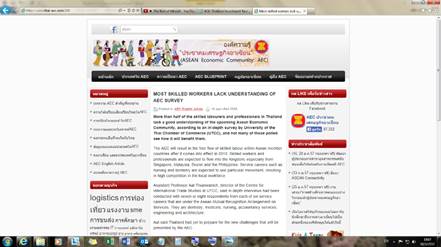Module 6: ASEAN Legal Aspects
Table of Contents
Activities
Activity 11
Awareness of free flow
Read the following text and answer the questions. What is it like in your country?

(Source: http://www.thai-aec.com/206 retrieved 11/2/2014)
Most skilled workers lack understanding of AEC survey
Posted in:AEC English Article16 February2012
More than half of the skilled labourers and professionals in Thailand lack a good understanding of the upcoming ASEAN Economic Community, according to an in-depth survey by the University of the Thai Chamber of Commerce (UTCC), and not many of those polled see how it will benefit them.
The AEC will result in the free flow of skilled labour within ASEAN member countries after it comes into effect in 2015. Skilled workers and professionals are expected to flow into the Kingdom, especially from Singapore, Malaysia, Brunei and the Philippines. Service careers such as nursing and dentistry are expected to see particular movement, resulting in high competition in the local workforce.
Assistant Professor Aat Pisanwanich, director of the Centre for International Trade Studies at UTCC, said in-depth interviews had been conducted with seven or eight respondents from each of six service careers that are under the ASEAN Mutual Recognition Arrangement on Services. They are dentistry, medicine, nursing, accountancy services, engineering and architecture.
Aat said Thailand had yet to prepare for the new challenges that will be presented by the AEC.
He said the survey found that only 50 per cent of dental practitioners in Thailand had a good understanding of the AEC and most of them saw no real benefit from it to their careers.
More than 50 per cent of medical practitioners did anticipate some benefits from the AEC. However, they preferred to stay in Thailand rather than other ASEAN countries because of the Kingdom’s high standards of medical services. They also don’t want to have to adjust to new cultures. Many want to go to developed countries in North America or Europe when they upgrade and grow their career paths.
“Nursing and dentistry will be the most worrying careers, as they will be challenged by inbound professionals from the Philippines and Europe respectively,” Aat said.
He said that according to the survey, only 20 per cent of nurses had a good understanding of the AEC and recognised its benefits. They also had little interest in working abroad, particularly in ASEAN countries. About 80 per cent of accountants had a good understanding of the AEC, but only half of them saw any real benefit in it.
Only 30 per cent of engineers understood the AEC well, and only 10 per cent saw it as beneficial. Thai engineers work to comparable standards to Singapore and the Philippines, but they have a disadvantage in terms of English-language ability.
Half of Thai architects still lack a good understanding of the AEC and recognise its benefits. However, they see it as a good opportunity to work abroad, especially in Brunei, Cambodia, Laos, Myanmar and Vietnam. Aat said the government should educate skilled labourers and professionals on the benefits and opportunities of the AEC before it kicks in.
By: The Nation
อ่านต่อ: http://www.thai-aec.com/206#ixzz2ssvaY5Zp
(Source: http://www.thai-aec.com/206 retrieved 11/2/2014)
What are the situations of the following professionals in Thailand concerning the free flow of skilled labor, according to the reading text?
|
||
1. Medical practitioners |
|
1. 50% anticipate the benefit but preferred to stay in Thailand. 2. Will be challenged by inbound professionals from the Philippines and Europe 3. 80% understand the AEC but half saw real benefit 4. 30 % understood well; only 10% saw it beneficial. 5. Did not mention |
2. Nurses and dentists |
|
|
3. Accountants |
|
|
4. Engineers |
|
|
5. Surveyors |
- What is the situation in your country?
|
Click Answer Key: (open answers) |
1. Medical practitioners |
|
2. Nurses and dentists |
|
3. Accountants |
|
4. Engineers |
|